

PayPal As Moral Police? Forces E-Book Sellers To Remove Certain Erotica Content. Adult content has long been a big draw, and one of the most profitable, in the world of digital media, but a recent move by PayPal is a sign of how one part of that business may be facing some problems up ahead.
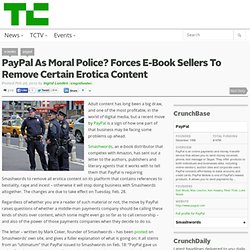
Smashwords, an e-book distributor that competes with Amazon, has sent out a letter to the authors, publishers and literary agents that it works with to tell them that PayPal is requiring Smashwords to remove all erotica content on its platform that contains references to bestiality, rape and incest – otherwise it will stop doing business with Smashwords altogether. The changes are due to take effect on Tuesday, Feb. 28. Regardless of whether you are a reader of such material or not, the move by PayPal raises questions of whether a middle-man payments company should be calling these kinds of shots over content, which some might even go so far as to call censorship – and also of the power of those payments companies when they decide to do so.
Legal Censorship: PayPal Makes a Habit of Deciding What Users Can Read. PayPal has instituted a new policy aimed at censoring what digital denizens can and can’t read, and they’re doing it in a way that leaves us with little recourse to challenge their policies in court.
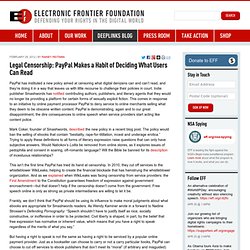
Indie publisher Smashwords has notified contributing authors, publishers, and literary agents that they would no longer be providing a platform for certain forms of sexually explicit fiction. This comes in response to an initiative by online payment processor PayPal to deny service to online merchants selling what they deem to be obscene written content. PayPal is demonstrating, again and to our great disappointment, the dire consequences to online speech when service providers start acting like content police.
Mark Coker, founder of Smashwords, described the new policy in a recent blog post. Free Speech Coalition Calls on PayPal to Back Off Misguided Book Censorship Policy. UPDATE (3/13/12): After public pressure, PayPal has revised their policy for censoring publishers of erotic ebooks.
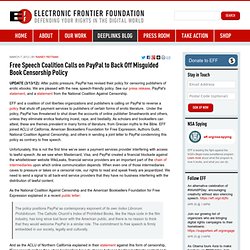
We are pleased with the new, speech-friendly policy. See our press release, PayPal's statement, and a statement from the National Coalition Against Censorship. PayPal Forced Into Erotica U-Turn. PayPal Announces New Speech-Friendly Policy for Online Book Sales. San Francisco - Payment service provider PayPal has announced a new speech-friendly policy for online book sales, reversing plans to shut off payment processing to publishers of certain forms of erotic literature.
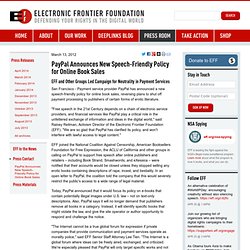
"Free speech in the 21st Century depends on a chain of electronic service providers, and financial services like PayPal play a critical role in the unfettered exchange of information and ideas in the digital world," said Rainey Reitman, Activism Director of the Electronic Frontier Foundation (EFF). "We are so glad that PayPal has clarified its policy, and won't interfere with lawful access to legal content. " Today, PayPal announced that it would focus its policy on e-books that contain potentially illegal images under U.S. law – not on text-only descriptions. PayPal Updates Erotica Policy: Target Is Specifc Books With Obscene Images, Not Just Words.
This just in… As we reported it would do yesterday, PayPal has today issued a significant update to its acceptable use policy regarding payments for certain erotica-themed e-books.
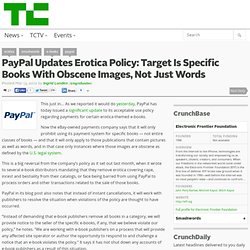
Now the eBay-owned payments company says that it will only prohibit using its payment system for specific books — not entire classes of books — and that it will only apply to those publications that contain pictures as well as words, and in that case only instances where those images are obscene as defined by the U.S. legal system. This is a big reversal from the company’s policy as it set out last month, when it wrote to several e-book distributors mandating that they remove erotica covering rape, incest and bestiality from their catalogs, or face being barred from using PayPal to process orders and other transactions related to the sale of those books.
Mark Coker, the CEO of Smashwords, was the person who originally made public PayPal’s policy on erotica when it was first issued in February. PayPal impose de censurer des littératures érotiques. Les grands censeurs d'aujourd'hui ne sont plus les gouvernements ; ce sont les sociétés privées.
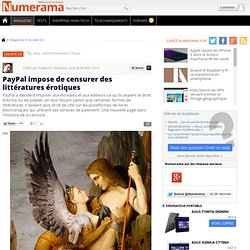
PayPal, qui est au centre d'un très grand nombre de transactions sur Internet, a pris la détestable initiative de regarder ce que vendent ses clients et de leur imposer de retirer certains produits, non pas parce qu'ils sont illégaux au regard de la loi, mais simplement parce qu'il les considère immoraux au regard de ses propres critères. La plateforme Smashwords, qui publie des livres numériques d'auteurs et éditeurs indépendants, a en effet révélé qu'elle a reçu un ultimatum de la part de PayPal.
Elle doit cesser de publier des livres décrivant certains types de scènes érotiques, ou devra se passer totalement des services de PayPal pour encaisser les paiements des consommateurs. D'autres sites et éditeurs ont reçu la même menace de la part du service de paiement en ligne, qui s'est imposé comme une plateforme difficilement contournable au fil des années.